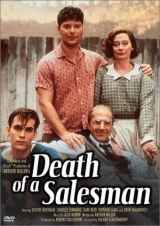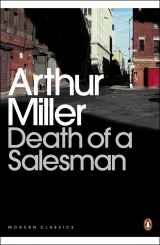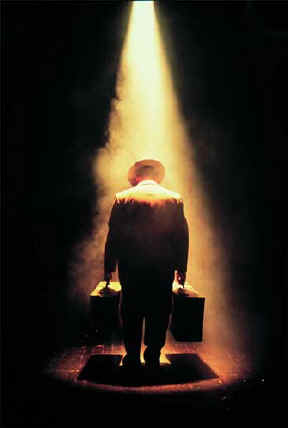Learning The Limits Of Our Values In Arthur Miller’s “Death of a Salesman”

Death of a Salesman by Arthur Miller, set in 1940s New York, shows us the limits of our moral, social and economic values, values still carried out today. This play is intemporal – by looking into the past and learning about the unfortunate life of the Lomans ( literally low-man), it helps us understand the failures of our beliefs and their consequences for the present and the future. It delivers a bleak conception of American society which beats an overpowering fear of failure into the hearts of its members. In the play, the capitalist world provides no hope or comfort to individuals who are considered “weak” and “different”. It raises and diffuses false ideas about success and manages to destroy any individual who does not fit into society’s definition of a “member”. Willy, the sixty year old father, pursues an unreachable dream of becoming the number one salesman in his firm. Linda, his wife, is more lucid on the situation but never stops his delusions, keeping alive his obsession. Happy and Biff, their sons, differ in every way – one blindly follows the step of his father whereas the other one bravely chooses to step away and pursue a simpler life where he feels accomplished. Through the very strong personality of each of his characters, Arthur Miller denounces how the American dream has failed and left individuals socially disoriented by portraying society’s dehumanisation of the individual and the dominance of industries. Willy’s wrong dreams emphasise the sadness of his wasted life. The addition of the Requiem and the use of stage directions and symbols help the audience understand the tragedy of the Lomans who are crushed under society’s rules.
In his play, Arthur Miller condemns capitalist values and delivers a fierce criticism of American society by offering a very bleak vision of modernity and industrialisation which dehumanises and destroys entire families. Men work for powerful, competitive, self-interested firms with high expectations, and there is no place left for creativity, individuality or diversity: men simply have to fit in desperately and maintain their place until they die. Willy at some point in the play understands how society works:
“…after all the highways, and the trains, and the appointments, and the years, you end up worth more dead than alive.”

This quote conveys how capitalism grabs everything a man can give to society, every piece of strength and work, and leaves him with no money, no compensation and no worth. Man is not at the centre of society’s preoccupations now, and in the end it feels like it is better to die than to live in a world that exhausts and enslaves men. In addition, Howard, Willy’s boss, is more preoccupied and interested in his new recording machine than the case of Willy: when Willy tries to interrupt him and ask him a favour, Howard aggressively responds “Sh, for God’s sake!“. Howard represents the firm and the capitalist values, and showing no interest in Willy conveys how the business world doesn’t give much importance to individuals but praises machines. The reader feels outraged by capitalism’s destructive effects on individuals and starts to see how bleak society can be.
With his character Willy, a fragile man who lives for the American dream, Miller illustrates the negative effects of a corrupted society which formats its members and leads them to the fear of failure, the fear of weakness and the fear of being different and not loved. Placing the emphasis on characterisation, the author conveys how Willy stays deeply attached to society’s values even if his firm puts him under pressure, and how his obsession with success leads him towards madness. He has been imbued with the desire to be popular, and he thinks money, a good job and a charismatic attitude can make people love him.
“And when I saw that, I realized that selling was the greatest career a man could want. ’Cause what could be more satisfying than to be able to go, at the age of eighty-four, into twenty or thirty different cities, and pick up a phone, and be remembered and loved and helped by so many different people?”
Here, we can see how society has moulded Willy into wanting to be popular and loved “by so many people”, as if it was the most important thing in the world, before freedom, family and happiness. Willy doesn’t feel comfortable in his job, but he keeps on believing it is the only way to achieve a “valuable” life. He wants to be “remembered”, something nearly every man aspires to: it reflects the idea of death and the fear of not being useful, of not achieving anything in the world, of being like everybody, like “nobody”. People like Willy tend to forget that the individual’s happiness, virtue and love are worth more than success.

By adding the Requiem at the end of the play, Miller emphasises the bleakness of the Lomans‘ story and presents how Willy’s values have been distorted by society to the extent that it pushes him to commit suicide for nothing. Willy dies with the absolute certainty that the insurance will leave money to his family, still believing wealth is a priority. No one comes to the funeral, showing how capitalism has completely overshadowed human relations. Linda is now free from payment, but left alone in her grief. Biff clearly understands that Willy has been completely perverted: “He had the wrong dreams.” Biff is not going to follow his father’s path, which offers some sort of hope to the audience as he will not repeat his father’s mistakes. He understands that what society has bleakly and imposingly taught them to believe in is wrong, whereas Happy doesn’t: “He had a good dream. It’s the only dream you can have –to come out number-one man.” Happy still believes success and popularity are the two dreams any man should have, which is appalling for the audience. With the characters of Willy and of his sons, offering an interesting contrast between Biff and Happy, Miller illustrates how a corrupt and bleak society has turned men into believers in the American Dream and has led them to disillusionment, failure and unhappiness.
Stage directions and setting are extremely important to understand under what conditions the Lomans lived: they demonstrate how a man like Willy and his family are crushed under this harsh, cruel and demanding society, which leaves little space for them to flourish. We can see how society has compressed the Lomans since the beginning of the play when Miller describes their small house surrounded by “towering, angular shapes”. This image describes the huge and modern buildings, looking dangerously at the small house as if they were ready to smash it. This is a metaphor to present capitalism and big firms oppressing Willy and his family who are not meant for the city life, but rather prefer the simple life and countryside. They like to work with their hands, and Willy is not very charismatic – this may be the reason why he is not good at his job and why his firm rejects him, just as society crushes any man who doesn’t fit in. The last line of the play depicts the “darkening stage“, which conveys to the audience an impression of defeat and gloom, and emphasises the tragedy of the Lomans who cannot cope with modernisation. The “hard towers” that “rise into sharp focus” picture society as menacingly triumphant, becoming more and more concrete and overtaking individuals and families.
The abundant use of symbols help the reader visualise the negative effects of the corrupted society Miller is describing. When Howard tells Willy he is fired, he finally perceives the reality of the capitalist world and says:
“You can’t eat the orange and throw the peel away – a man is not a piece of fruit!”
This metaphor depicts how firms dehumanize individuals and take all their “substance” and strength away, as if they eat a fruit and throw “the peel away”; they use the man until there is no more left to use. It conveys how society doesn’t work and doesn’t care for its people, leaving them to die after taking everything they had, and it convinces the reader that society is bleak. Just before getting fired, Willy talks to his wife and tells her that he wants to plant seeds in the garden. The seeds symbolize the hope for prosperity and success that Willy desperately wants to achieve after working so hard all those years. They reflect on his failure as he declares: “Nothing’s planted. I don’t have a thing in the ground” and Linda adding “Nothing’ll grow anymore.” It shows how, even unconsciously, they are aware of their misfortune and despair as neither Willy nor his sons achieved anything. Neither Willy nor his sons grew seeds in the garden: they were “infertile” and “unfruitful” because of society’s high expectations and low consideration of their family. The reader feels sorry for the family as well as discouraged and scandalized by society’s harshness.

In Death of a Salesman, society is depicted as bleak and harmful towards individuals. It has indoctrinated false ideals in people and rejected those who are not considered part of its definition of “success”. Arthur Miller conveys how capitalism dehumanises men through the character of Willy, imbued with false dreams and values, leading him to a tragic death. The addition of the Requiem adds to the sadness of Willy’s destiny, and the stage directions as well as the symbols portray the despair and the oppression of the Lomans in the capitalist world. It has succeeded in showing how the American Dream has turned people against their own nature, believing that their difference cannot be cultivated or tolerated. America has not always been a country striving for equality, freedom, happiness and rights: it has also experienced darker times.
What do you think? Leave a comment.











I saw it on Broadway and it was absolutely an amazing experience. This play is so great and still today so relevant. Awesome article, thank you.
Although I read it for school, it was still great. I’m touched and amazed by Arthur Miller’s skill in crafting such a complex novel that addresses so many issues. I react to only one here: the pressures of reality verses the strangulation of a fragile web of lies.
Death of a Salesman is a stunning, powerful drama, reflective of the confusion of the “new” American sales family. The characters were believable and easy to empathize with, though I could not really sympathize with any of the characters except, perhaps, Biff and Willy’s brother, Ben.
Actually, I finished reading the play on the subway this morning, and was so affected, that I nearly missed my stop. To describe this: real, gut-punching.
I walked through Grand Central this morning a little less special, a little more at peace.
Enjoyed reading this article. Miller’s depressing, intimate look into the financial/emotional/mental breakdown of a middle class salesman in post-WWII New York is rife with theme and allegory; the assimilation of business and practice into human connection, the domestication of the American Dream (as so many of these post-war era works espouse), and the worth of the common man in an ever-tightening economy…sound familiar?
A slow but meaningful piece.
I enjoyed this play because it is still so relevant. The concept of the American dream continues to grow exponentially as the new generations emerge from their parents’ suburban womb yet the work ethic continues to dwindle. The current Age of Entitlements has bred an army of Loman’s….and that’s not a societal trait worth bragging about.
I have read this play twice: once when I was thirteen and again when I was a junior in high school as part of the required reading. As with most classic books, I didn’t really like it the first time around. When I listened to the reactions and opinions of my classmates in high school, I realized that this was the common case. The biggest reason is that it is depressing. Teenagers already battle against hormones. They don’t need to read tragic stories of suicide to top it.
Honestly, Death of a Salesman should not be a mandatory reading for high school students, and parents, please do not force your children to read this simply for the sake of its literary value. Instead, have them watch it as a performance when they are old enough to really understand the meaning behind the tragedy. I will say that I saw the 1985 movie with Dustin Hoffman in class, and it was very well done.
Wow nice post! This is part of our English literature studies.
I didn’t like Death of a Salesman very much. All of the characters were horrible people (except maybe Happy, but he has his flaws to). I think the theme is hope. In the past, Willy’s life is perfect (at least it seems that way). His family has big dreams for the future. After Biff fails to get into collage, Willy starts losing hope that things will ever be better. He starts failing at his job and has to get loans from his neighbor. Eventually this leads to his own demise. I think what the author is trying to say about this theme is that no matter what happens, you should learn from your mistakes and try again. Hopefully, this will keep you from a death like Willy’s. lol
I think the characters are not meant to be sympathetic, to be honest. You do feel sorry for them and for their situation, but they are not flawless. But what Miller shows is that their flaws are a product of the society they live in. There is always a reason to explain their behaviours. For me, Happy is probably one of the worst in terms of morality, and he offers no hope at all, completely blind to the sufferings of his father and ready to follow his steps. But his behaviour can be explained with his parents’constant devaluation and undermining of him compared to Biff. I agree that the author might imply that it is important to learn from your mistakes, but I don’t think he says that you have to try again. On the contrary, you have to change and accept change. Willy never stops trying, which leads him to death and failure, because he cannot accept the fact that he is not meant for this type of life, and because he refuses to accept his true nature. But although he is to blame, he has been formatted by the society he lives in. So for me, what Miller is showing is more than a simple moral lesson, more than ‘you have to learn from your mistakes’. It’s a far more political and social message – that capitalism imprisons individuals into a mechanism they cannot control and that completely dehumanises them (we all know he was a socialist, and often considered a communist writer). It’s in this light, and by paying more attention to the techniques used such as symbols and the beauty of the text itself, that I started to love DOAS 🙂
Wonderful article. Always glad to see more of the classic American dramas.
I would contest only one thing about the article: the point made about society’s indoctrination of false ideals and its unrealistically high expectations for the Lomans. I think what Miller is trying to show is that the modern world (esp. at the time of the play’s conception) continually changes its ideals and structure, regardless of the efforts of one man. The tragedy of the scene with the “recording machine” is not specifically capitalism’s emphasis on machine over man (it’s more than that); it is Willie’s inability to adapt to the modern world.
Yes, Willie’s ideals are the product of society, but these ideals were not false when Willie initially adopted them. Over time, society shifted, and its ideals shifted with it. Willie refused to change, and thus he cannot exist peacefully in the changed world.
Just went over this as a candidate for teaching. I hadn’t remembered the intensive misogyny of the characters. I’m looking at this one as a classic of the anti-hero genre. Willie has nothing to offer but flaws and delusions, yet we don’t mind that so much as his passivity. If he would just DO something, even something hateful, we could begin to grapple with him as anything other than a cipher. However, he obliterates himself with his only decisive action leaving us to judge an absence rather than a man.
From the very beginning of our lives we are accustomed to believing we can be anything we want but also that we will be great.
This is a play that we had to read in writing arts. I didn’t find it that interesting but it had really surprising events.
One of my favorite plays. Great job on exploring the play’s themes and your analysis, especially your discussion on the play’s stage directions.
Great analysis. This play does not get enough credit. I’m happy you chose to write about it.
An excellent and overall forceful interpretation of a brilliant play. There is an expectation that “society” be read as capitalist, dehumanising society, but to make the comment is a minor quibble. Excellent on stage directions and their import.
Gender neutral language–the forces at work have a demonstrable effect on women too–as well as elaboration of Howard’s tape recorder’s mechanical reproduction (with a nod to Walter Benjamin), and Raymond Williams’ trenchant line–“this is a man who from selling things has passed to selling himself , and has become […] a commodity” (Drama from Ibsen to Brecht, 1964) will round the article out nicely.
Hi, I’m wondering if you have an idea of other plays that best depict the effects of capitalism on man, if you do please send them to me thanks
The critique I’m seeing here is more along the lines of hyper-consumerism.